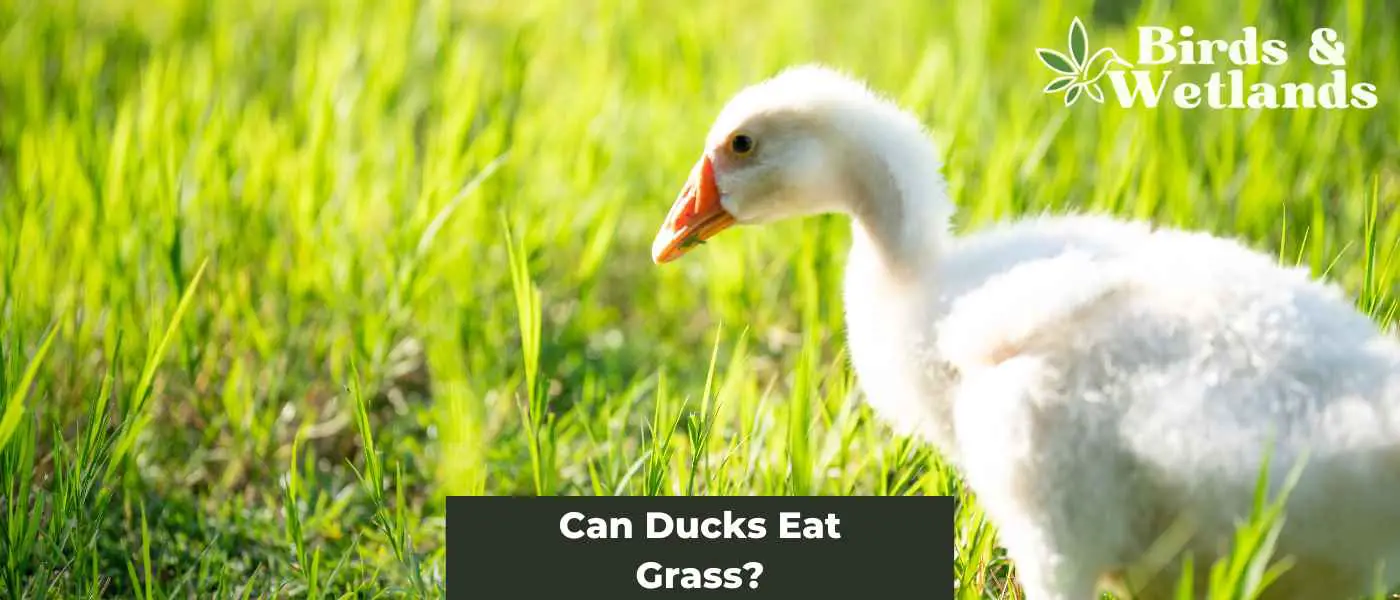Have you ever seen a duck grazing in a grassy field and wondered if it can actually digest grass?
Yes, ducks can eat grass as part of their varied diet. Grazing on grass provides them with essential nutrients and fibre. However, it should not be their sole food source. Ducks thrive on a diverse diet that includes aquatic plants, seeds, insects, and small fish, ensuring they receive all the necessary nutrients for a healthy life.
Key Takeaways
- Ducks can eat grass, but there should be more sources of nutrition in their diet. A balanced diet that includes a variety of other foods is essential for maintaining these fascinating birds’ overall health and well-being.
- Ducks should only be eating fresh grass and never feed ducks hay and dry stalks of grass.
- Ducks love to eat leafy greens and weeds.
If you’re keeping ducks as pets, you may have asked yourself this question. Finding reliable information on what ducks can and can’t eat can be challenging, and it’s important to ensure that you provide your feathered friends with a healthy and balanced diet.
That’s why I’ve decided to write this post – to provide you with the information you need to make informed decisions about your duck’s diet and ensure that they are happy and healthy.
Can ducks digest grass?
To understand whether ducks can digest grass, it’s important first to understand a little bit about how they digest food.
Like other birds, ducks have a simple digestive process that consists of a gizzard and an intestine. The gizzard is a muscular organ that grinds up the food with the help of small stones or grit that the duck ingests. This grinding action helps break down the food so it can be more easily digested in the intestine.
Now, let’s talk about grass. While it is true that ducks do eat grass and other plant material in the wild, they are not necessarily designed to digest it in the same way that cows or other ruminants do.
Ducks do not have the same complex system for digestion as ruminants, allowing them to break down and digest grass more efficiently.
However, this doesn’t mean that ducks can’t digest grass at all. In fact, ducks are capable of digesting and utilizing nutrients from grass and other plant material.
Do domestic ducks eat grass?
Yes, domestic ducks eat grass. However, remember that they can’t get all the nutrients they need from the grass, so you need to supplement their diet with other plant-based foods.
What are the health benefits of feeding grass to ducks?
Grass is a valuable source of nutrients for ducks.
- Protein – For strong muscles, feathers, and bones.
- Calcium – To produce strong eggshells.
- Vitamin A – Important for maintaining good vision.
- Vitamin C – Boosts the immune system
- Iron – Plays a role in oxygen transport within cells.
- Phosphorus & Magnesium – Help regulate body functions such as digestion and metabolism.
- Dietary fiber – Aids in digestion, prevents constipation and keeps things moving through the digestive tract.
- Omega-3 fatty acids – Support brain development, especially in ducklings.
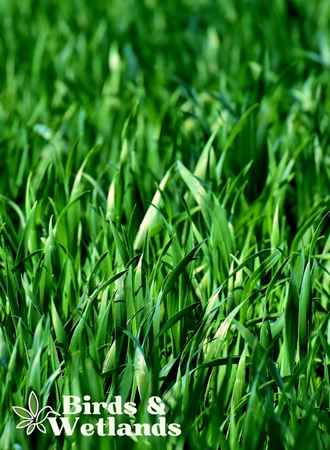
What are the potential risks of feeding grass to your ducks?
Feeding grass to ducks can have some nutritional benefits, but it is also important to be aware of the potential risks.
The main risks of eating grass in birds is crop impaction or sour crop. The lack of crop in ducks doesn’t mean there are no risks associated with eating grass.
Ducks can get parasites from contaminated or rotting grass and infections from microbes in moist or wet grass.
Consuming too much grass can cause gastrointestinal issues such as diarrhea and vomiting, as well as an imbalance in their diet, leading to vitamin and mineral deficiencies.
Some types of grass may even contain toxins that can lead to fertility and reproductive health problems, as well as developmental delays in young ducks.
What kind of grass can a duck eat?
Ducks can eat a wide variety of grasses, including rye and wheat. For the most nutritious diet, provide ducks with grass varieties high in proteins and vitamins.
Ducks also prefer to eat young blades of grass because they are more tender and easier for their beaks to tear apart. However, mature blades of grass can still be consumed.
In addition, ducks may also eat various aquatic plants such as duckweed, watercress, pondweed, and eelgrass. These aquatic plants are rich in nutrients and provide an excellent source of nutrition for ducks.
Furthermore, when feeding your ducks, it is important to choose fresh vegetation with no trace of pesticides or other chemicals that can harm the birds. When selecting vegetation, ensure that the leaves are green and growing vigorously.
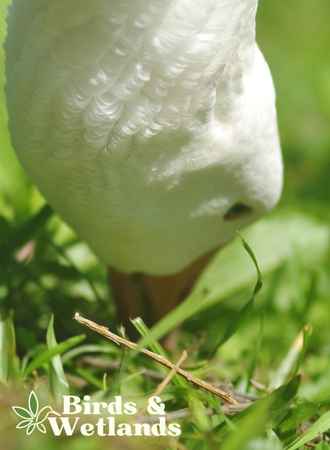
How much grass can ducks eat?
You can feed grass to ducks, but they should eat other safe plants to get enough nutrients.
While grass contains nutrients, they are not high enough. Free-range ducks can get vitamin D from sunlight alone. But if they solely forage and consume grass, they will suffer from nutrient deficiencies. However, if your duck’s daily diet is supplemented with other foods, they can enjoy occasional grass treats without any risk to their health.
How much grass they eat will also depend on the species – some duck breeds have stronger digestive systems than others and can tolerate more grass in their diets.
Generally, it is best to keep their grass intake below 25% of their daily food consumption for optimal health and nutrition. Ducks need a balanced diet rich in proteins, minerals, vitamins and essential fatty acids to stay healthy.
Grass should only be seen as an occasional treat or supplement, not as the primary source of sustenance for your feathered friends.
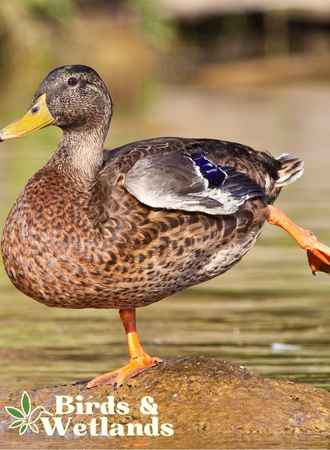
Can ducks eat mowed grass?
Did you know that letting your ducks munch on freshly mowed grass can actually be good for their health? It’s true! Mowed grass is packed with essential vitamins and minerals, like Vitamin A and magnesium, which are key to maintaining optimal duck health.
Plus, ducks are naturally inclined to graze on grass, herbs, and other plants that they can’t get from their regular diet.
But be sure only to offer your ducks mowed grass that you know is completely safe and reliable. If there’s any uncertainty about the grass’s quality or potential chemical contamination, it’s best to steer clear. Also, avoid feeding stringy grass and treated grass to your ducks.
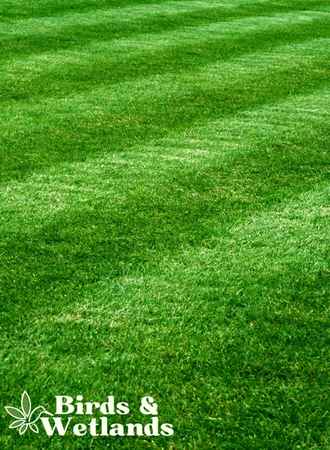
Can ducks eat grass clippings?
Yes, ducks can eat grass clippings as long as they are freshly cut and do so in moderation. Keep grass clippings fresh by storing them in ponds or water tubs.
When can ducklings eat grass?
Ready to give your ducklings a taste of the great outdoors? The best time to introduce them to grass growing in your duck pond is when they’re a couple of weeks old and the weather is warm.
For the safety of young ducklings, ensure the lawn where they roam hasn’t been treated with pesticides and that grit is added to their feed to help them digest the grass easily.
Additionally, give your baby ducklings access to clean ground that adult birds haven’t visited in the last 6-12 months to help prevent bacterial or parasitic infections.
Ducklings in the growth stage eat more per ounce of body weight than little chicks, so keep this mind when you provide grass to your young feathered pals.
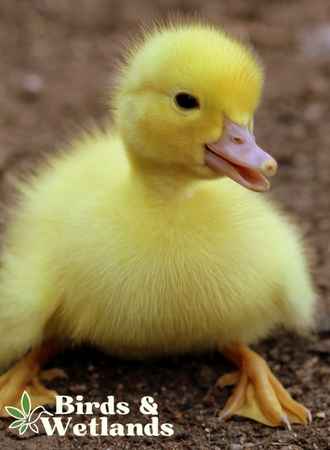
Do ducks eat weed?
Ducks are omnivores, which means they get their nutrition from either plants or animals. They can devour large amounts of food in a single sitting and enjoy eating weeds.
Weeds such as dandelions, chickweed, clover, and wild lettuce contain high levels of calcium, magnesium, iron, and amino acids, which are essential for ducks’ proper growth and development.
Can ducks eat hay?
Feeding Hay to ducks can be dangerous, as it can easily get stuck in their throat and cause them to choke. Ducks have no teeth and cannot chew their food like other animals. They swallow whole food, so anything they eat must be small enough to pass through their digestive system without causing blockages.
On the other hand, hay is made up of long, fibrous strands that can easily get stuck in a duck’s throat.
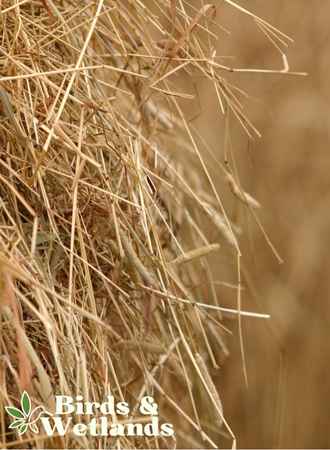
Other duck foods to consider:
Best Duck Feed Pellets
Are you a duck owner looking for the perfect feed to keep your feathered friends happy and healthy? Look no further than Purina Duck Feed Pellets! With their nutritionally balanced formula and high-quality ingredients, these pellets are the ultimate solution for providing your ducks with the nutrition they need to thrive.
Pros
- Complete Nutrition: Purina Duck Feed Pellets are nutritionally balanced to provide all the essential vitamins and minerals that ducks need to stay healthy and strong.
- Easy to Digest: The pellets are specially formulated to be easy to digest, which makes them ideal for ducks of all ages.
- Promotes Growth and Development: With its balanced nutrition formula, Purina Duck Feed Pellets are designed to support healthy growth and development in ducks.
- Suitable for All Breeds: Whether you have domestic ducks or wild ducks, Purina Duck Feed Pellets are suitable for all breeds of ducks.
- Trusted Quality: Purina has been producing high-quality animal feed for over 100 years, so you can trust that your ducks are getting the best possible nutrition with Purina Duck Feed Pellets.
Cons
- Cost: Compared to other types of duck feed on the market, Purina Duck Feed Pellets can be slightly more expensive. However, many customers feel that the high-quality ingredients and balanced nutrition formula are worth the extra investment.
- Pellet Size: Some customers have noted that the pellet size of Purina Duck Feed Pellets can be quite large, which may not be suitable for smaller or younger ducks. However, many customers have reported that the pellets can easily be broken up or soaked in water to make them easier to eat.
| Lettuce | Lettuce: A Healthy Green for Ducks? |
| Spinach | The Benefits of Spinach for Ducks |
| Cabbage | Cabbage: A Leafy Green Treat for Ducks |
| Brussels Sprouts | Brussels Sprouts and Ducks: A Perfect Match? |
| Cauliflower | Cauliflower and Ducks: A Nutritious Combo? |

